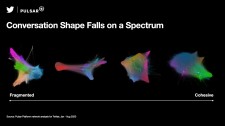Pulsar Teams Up With Twitter to Build the Future of Audience Intelligence for Advertisers

LOS ANGELES, October 19, 2020 (Newswire.com) - Twitter is a key layer of the public conversation: it’s where culture ignites, reflects, and refracts. In much of the world, it’s where the conversation begins, and begins to spread.
For years, Pulsar has championed a social intelligence approach that looks at the conversation while mapping the invisible social structures of the audience behind it.
“We call it the Shape of Virality, where the key theory is that the shape of an audience, its social ties and affinity networks, predicts and explains how ideas spread and how content travels,” says Francesco D’Orazio, co-founder & CEO of Pulsar.
So we put this theory to the ultimate test in a new insight partnership with Twitter Research.
Our goal was to understand: What impact does paid activity on Twitter have, in terms of both conversation spread and audience growth? How can brands plan campaigns that find a great fit with their audience, pulling the right levers with paid and earned tactics to optimize for conversation? Here is what we found.
Understanding the Shape, and substance, of the conversation
The key to this analysis was to understand two key characteristics of a conversation: its shape and its substance. The substance of a conversation is what an audience is talking about in terms of topics, themes, and sentiment. The Shape of a conversation on the other hand represents the communities contributing to the conversation (based on how interconnected users are and how similar their interests are).
The shape of a conversation falls on a spectrum: on one end, fragmented (signaling a more varied audience involved in a conversation), and on the other end cohesive, where the communities within the audience are more similar and more closely connected to each other.
Different audience shapes call for different tactics – including targeting, content, and spend – in order to drive conversation, engagement and business outcomes.
Case Study #1 – Reducing the Fragmentation in a Music Conversation
The first example we analyzed was a campaign for an entertainment client aimed at driving buzz around highly anticipated new music releases. In this campaign, the Twitter and Pulsar research teams detected a fragmented conversation shape, with siloed, distinct fandoms for each artist, and minimal follower overlap. You can see the network graph and volume trendline visualizations here.
In this case, promoted content was targeted to different communities on Twitter, based on their interest and affinity with certain artists.
Different communities participating in the conversation became active when their favorite artist was featured, creating a disjointed conversation.
To drive a higher volume of conversation and deeper penetration, the entertainment brand could activate audiences with overlapping affinities through personalized content, targeting a “bridge” between fandoms and increasing the likelihood of a more cohesive conversation, where buzz is built at the intersection of two or more audience communities.
Case study #2 – Amplifying reach for a TV launch
The second campaign we analyzed with the Twitter Research team related to the launch of a new TV show. In this case, the conversation shape was much more cohesive, with significant audience follower overlap, evident when looking at the shape graph, where communities are more intertwined.
You can see the network graph and volume trendline visualizations here.
The greater overlap is also evident when looking at the conversation trend line. Buzz tended to be synchronized across communities, particularly around release day – a topic (substance) that was relevant to all the participating communities.
Based on this analysis, this brand could expand the reach of the campaign by finding and activating communities with similar interests to the ones already participating in the conversation.
Media contact
Davide Berretta
davide.berretta@pulsarplatform.com
Source: Pulsar
